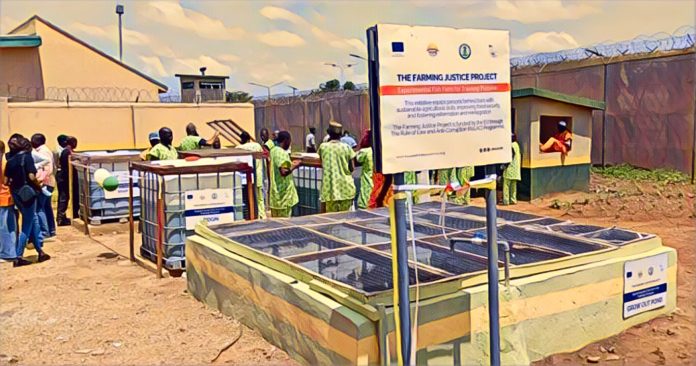Key Points
-
Farming initiative to tackle food insecurity trains inmates in agriculture.
-
Project aims to boost both inmate rehabilitation and food production.
-
Collaboration between HBBA and NCoS seeks sustainable correctional reform.
To help people who are hungry and help them get better, the human rights group The Hope Behind Bars Africa (HBBA) has worked with the Nigerian Correctional Service (NCoS) to start a farming project at the Kuje Custodial Centre in Abuja. On Tuesday, October 14, 2025, the project officially began.
According to a report by the Punch news, Funke Adeoye, the Executive Director of HBBA, said at the event that the initiative connects policy and practice in reforming the prison system. She said, “We think that rehabilitation should do more than just fix morals; it should also teach people skills that will help them live.”
The European Union is paying for the project through International IDEA as part of the Rule of Law and Anti-Corruption (RoLAC) program. Adeoye says that more than 80 inmates will learn modern farming techniques at the Kuje site, including how to grow tomatoes, watermelons, and okra.
Giving inmates power through training in farming
The project will focus on growing crops, raising fish, and raising chickens inside the prison. The experimental farm that has already been set up at Kuje is the first step. HBBA wants to expand the program to more correctional facilities in Nigeria. Adeoye said that some of the food has already been eaten by inmates, which shows that the project has two goals: to give inmates power and to grow food.
Christopher Jen, the FCT Command Controller of Corrections for NCoS, welcomed the partnership and called Kuje a “centre of excellence in skill acquisition.” He said that the program shows a change in the way people think about jail, going from just holding people to helping them reintegrate into society.
Rehabilitation to fight food insecurity
Inflation and climate change have made Nigeria’s food security problem worse, so new solutions are needed. The farming program to fight food insecurity takes advantage of this trend by using land from correctional centres to grow food and teach inmates useful skills. HBBA says that this connection between justice reform and agricultural productivity is intentional: “With the change in name from ‘prison’ to ‘correctional service,’ we needed to make sure that our custodial centres reflected that change through real rehabilitation,” Adeoye said.
A step towards long-term reform of the prison system
NCoS will keep an eye on how training affects inmates’ behaviour, their ability to find work after they get out of prison, and their ability to reintegrate into the community.
Adeoye pointed out that out of more than 80,000 inmates in the country, only about 3,600 are on death row. This means that most of them will eventually go back to society. She said, “The goal of the project is to lower the number of repeat offenders by making sure that inmates have ways to make a living after they get out of jail, which also adds to the food insecurity in prisons.” Other African countries that want to combine rehabilitation and agricultural development may look to this partnership as an example.
The initiative is part of a larger effort by NCoS to support partnerships and change, with help from the EU, International IDEA, and private-sector groups. If the program is expanded, analysts say it could change how Nigeria thinks about prison, farming, and reintegrating people into society.



